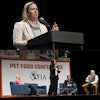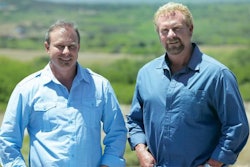
Poland’s pet food market posted a solid increase of 9% in 2014, with sales expected to expand by a further 5% to a total of PLN2.3 billion (US$639 million) in 2015, according to figures released by market research firm Euromonitor International. With the local market growing at a fast pace, European producers are aiming to bolster their production capacities in Poland.
Swiss-based Nestlé recently launched a new pet food production facility in Nowa Wies Wroclawska, in Poland’s south-western region of Lower Silesia, under an investment worth PLN300 million (US$83.3 million). The plant is currently operated by a workforce of 250, and the producer is aiming to create some 150 new jobs at the factory by the end of 2015. Under the plan, Nestlé is to invest more than PLN150 million (US$41.7 million) at the facility, which will also host a designed pet food distribution center for the region.

Courtesy Nestlé
Swiss-based Nestlé recently launched a new pet food production facility in Poland’s south-western region of Lower Silesia, under an investment worth US$83.3 million.
Nowa Wies Wroclawska is located slightly more than 16 kilometers from the city of Wroclaw. The latter city of about 630,000 inhabitants is well connected with neighboring Germany and the Czech Republic owing to its location on the E40 and E67 European routes. With the planned expansion, the production facility could see its output capacity doubled by the end of 2015.
"The factory in Nowa Wies Wroclawska is part of a well-functioning Purina network which is continuing to grow,” said José Ignacio Lopezmalo Perezcarpy, the director of the new production facility. “Currently, Nestlé Purina PetCare employs more than 50 people at the company’s Polish headquarters, and at the new plant, in the first phase of the investment, more than 250 people were employed.”
The plant makes a wide range of products under the Nestlé Purina PetCare brand, according to the firm. Moreover, it is Nestlé’s first production facility of this kind in Poland, as well as the group’s third pet food plant in the region of Central Europe, located between Germany and Russia. The facility is fitted with a total space of some 135,000 square meters (1,453,128 feet), of which 4,000 square meters (43,055 feet) were earmarked for offices. In the first phase of the investment, the factory will mostly produce cat food under the brand of Felix, and its output will be supplied to the Polish and German markets, as well as to selected countries from the region, according to Nestlé.
The plant’s location in Poland is part of the Swiss group’s strategy to strengthen its presence in the local market. Currently, Nestlé holds a market share of over 12% in Poland, the largest market for pet food in the Central European region, with some 7.8 million dogs and 6.1 million cats living in Polish households, according to estimates by Euromonitor International. The manufacturing project was carried out by the group’s local subsidiary, Nestlé Polska S.A. Over the past ten years, the Swiss group has invested some PLN2 billion (US$555.5 million) in expanding its Poland-based production capacities.
The plant in Nowa Wies Wroclawska was officially launched on March 16, 2015, in the presence of company and government representatives. "Owing to Nestlé's investment, new jobs will be created,” said Poland's Deputy Minister of Economy Ilona Antoniszyn-Klik. “The company will also establish cooperation with local suppliers."

Courtesy Nestlé
The plant is part of Nestlé's strategy to increase its presence in the local market. To that end, the company has made a point of hiring locally and will mostly depend on local suppliers.
Company representatives have confirmed that the new factory will mostly rely on deliveries from local suppliers. "Through our investments, we aim to become an integral part of local communities, and this is also how we perceive our role,” said Simon Smith, the chief executive of Nestlé Polska S.A. “We create new jobs, we buy raw materials from local suppliers and we establish sustainable, long-term partnerships."
Jacek Mecina, Poland’s deputy minister of labor, said that, with Nestle’s new plant in Nowa Wies Wroclawska, the company will aim to hire new employees who have recently entered the local job market, contributing to decreasing unemployment among the region’s youth. "Nestlé is a leader in employing young people,” he said. “This factory is an excellent example of how programs [to decrease youth unemployment] can be carried out. Among the employees who were hired at the Nowa Wies Wroclawska facility, a considerable share is less than 30 years old.”
In line with its philosophy of creating shared value, the group is putting emphasis on ensuring benefits for the municipality where its new factory is located, according to Smith. In addition to this, the facility’s location in close proximity of Wroclaw, one of Poland’s largest cities, and its proximity to the country’s borders with Germany and the Czech Republic enables the factory with developed transport capabilities for its output.

















